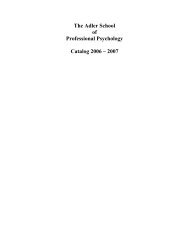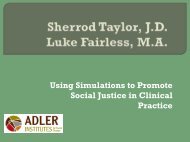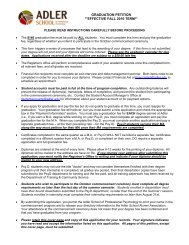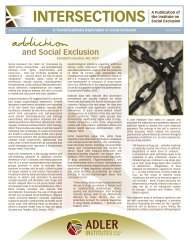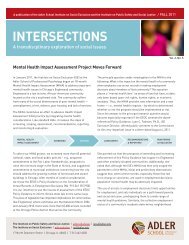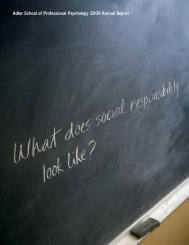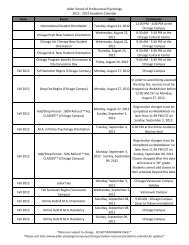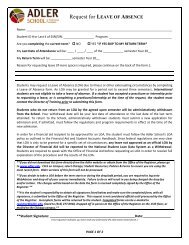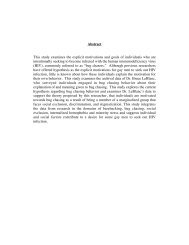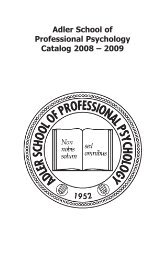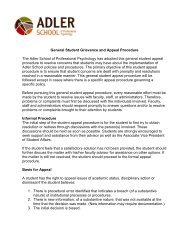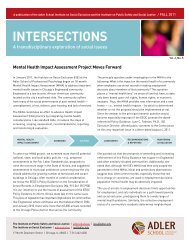2008 annual report - Adler School of Professional Psychology
2008 annual report - Adler School of Professional Psychology
2008 annual report - Adler School of Professional Psychology
You also want an ePaper? Increase the reach of your titles
YUMPU automatically turns print PDFs into web optimized ePapers that Google loves.
<strong>2008</strong> a nnual r eport<br />
seeing things differently
table <strong>of</strong> Contents<br />
President’s Message . . . . . . . . . . . . . . .2<br />
Message From the Board Chair . . . . . . . . .4<br />
Growth and Innovation . . . . . . . . . . . .5<br />
Excellence in Teaching . . . . . . . . . . . . .7<br />
Extending <strong>Adler</strong>’s Presence . . . . . . . . . . .8<br />
Institutes for Social Change . . . . . . . . . 10<br />
Leading the Social Responsibility Movement 14<br />
Planning for a Strong Financial Future . . . . 18<br />
Financial Growth. . . . . . . . . . . . . . . 19<br />
Board <strong>of</strong> Trustees . . . . . . . . . . . . . . . 23<br />
Benefactors . . . . . . . . . . . . . . . . . . 24
president’s m essage<br />
Raymond E. Crossman<br />
Looking around the <strong>Adler</strong> <strong>School</strong>, I see innovative work and passionate<br />
engagement in psychology as a potent force for social change. Our growth<br />
and achievements continue to surpass all expectations, and the<br />
2007-<strong>2008</strong> year – which marks the midpoint <strong>of</strong> our five-year strategic<br />
plan – was no exception.<br />
Now in its third year, our social responsibility curriculum has fueled<br />
an ongoing renaissance at the <strong>Adler</strong> <strong>School</strong> that has swept through our<br />
faculty, staff and students.<br />
Faculty and staff pioneered new courses and programs and, in this<br />
past year, immersed themselves in the work <strong>of</strong> deepening and<br />
extending the impact <strong>of</strong> those new <strong>of</strong>ferings. In the short time since the<br />
introduction <strong>of</strong> the Community Service Practicum now required <strong>of</strong> all<br />
<strong>of</strong> our students, the practicum has earned the <strong>Adler</strong> <strong>School</strong> national<br />
recognition and the respect <strong>of</strong> the community organizations it serves.<br />
It also has become a powerful draw for prospective students and faculty.<br />
While we continue to see dramatic growth in our enrollment, with<br />
an increase <strong>of</strong> more than 30 percent in just the past two years, we are<br />
preserving small class sizes (averaging fewer than 11 students per section),<br />
maintaining an excellent core faculty-to-student ratio (just over 11<br />
students per core faculty member), and strengthening the quality<br />
<strong>of</strong> our teaching by investing aggressively in faculty enrichment and<br />
pr<strong>of</strong>essional development.<br />
These are all signs <strong>of</strong> the renaissance that propels our students and<br />
faculty to pursue social responsibility through creative approaches.<br />
One example is the innovation <strong>of</strong> our Institute on Social Exclusion,<br />
which is working to change the way Americans approach public policy<br />
by raising awareness <strong>of</strong> the reasons people remain disadvantaged.<br />
The <strong>Adler</strong> <strong>School</strong> renaissance is taking place on our Vancouver<br />
campus as well, where — this year — our newly hired campus dean,<br />
Larry Axelrod, Ph.D., has led growth in faculty numbers and student<br />
enrollment, while also overseeing our move into a new, state-<strong>of</strong>-theart<br />
campus in downtown Vancouver. Dr. Axelrod also led efforts to<br />
realize Vancouver’s status as a gateway to Asia, continuing to grow<br />
<strong>Adler</strong> <strong>School</strong>’s international presence.<br />
All <strong>of</strong> this year’s accomplishments are part <strong>of</strong> a larger, vital movement.<br />
We all share a conviction – faculty, staff, trustees and students alike –<br />
that seeing things differently makes it possible for us to change our<br />
communities in positive, innovative ways, and this conviction is the<br />
energizing force that continues to extend the reach <strong>of</strong> our <strong>Adler</strong>ian legacy.<br />
Raymond E. Crossman, Ph.D.<br />
2<br />
ADLER SCh OOL OF PROFESSIONAL PSy C h OLOGy
“We all share a conviction – faculty, staff, trustees and<br />
students alike – that seeing things differently makes it<br />
possible for us to change our communities in positive,<br />
innovative ways…”<br />
h i s to ry <strong>of</strong> the<br />
a dler sCh ool:<br />
Alfred <strong>Adler</strong> is born in<br />
Penzing, Austria.<br />
<strong>Adler</strong> receives medical degree<br />
from the University <strong>of</strong> Vienna.<br />
Rudolf Dreikurs, founder <strong>of</strong> the <strong>Adler</strong><br />
<strong>School</strong>, is born in Vienna, Austria.<br />
a visual timeline 1870-<strong>2008</strong><br />
1870<br />
1895<br />
1897<br />
<strong>2008</strong> ANNUAL REPORT<br />
3
m essage from the b oard Chair<br />
Patricia Moten Marshall<br />
This has been an outstanding year for the <strong>Adler</strong> <strong>School</strong> and for the<br />
Board <strong>of</strong> Trustees.<br />
We are energized and proud to serve an educational community that<br />
challenges each member to do ever greater things.<br />
All <strong>of</strong> us are immensely pleased to see the progress that has been made<br />
in this third year <strong>of</strong> the <strong>School</strong>’s strategic plan.<br />
The <strong>School</strong> continues to experience robust financial and enrollment<br />
growth while increasing its investment in educational innovation and<br />
excellence. This year the <strong>School</strong>’s strategic goals included focused<br />
efforts in faculty support and development, international recruitment,<br />
and community engagement and partnerships.<br />
The Board endorsed an aggressive strategy to expand the <strong>Adler</strong><br />
<strong>School</strong>’s access to backing from outside sources, including grant<br />
funding. And we are especially proud that the Institute on Social<br />
Exclusion (ISE) is educating growing numbers <strong>of</strong> people about the<br />
<strong>of</strong>ten-overlooked injustices that affect this nation. The ISE’s success<br />
makes us eagerly anticipate the work <strong>of</strong> the recently approved second<br />
Institute – the Institute for Public Safety and Social Justice.<br />
We are confident that the <strong>School</strong> is positioned to grow and thrive –<br />
and to make a difference in our local and global communities – in<br />
ways that have never been more important. The <strong>School</strong>’s continuing<br />
record <strong>of</strong> achievement is clear evidence that we are in the midst <strong>of</strong> a<br />
significant and exciting renaissance in social responsibility.<br />
All <strong>of</strong> us on the board are motivated by our belief in what the <strong>Adler</strong><br />
<strong>School</strong> can achieve by graduating socially responsible students. We are<br />
at the forefront <strong>of</strong> powerful, transformative ideas in action. And we<br />
are proud to build and serve that ongoing work.<br />
Patricia Moten Marshall<br />
M.h.A., .A., Chair, Board <strong>of</strong> Trustees<br />
“We are confident that the school is positioned to grow<br />
and thrive – and to make a difference in our local and global<br />
communities – in ways that have never been more important.”<br />
<strong>Adler</strong> establishes a private practice in Vienna and publishes<br />
controversial first work: Health Book for the Tailor Trade, linking<br />
medical problems with poor working conditions.<br />
<strong>Adler</strong> accepts Sigmund Freud’s invitation to join his<br />
inner circle, the Vienna Psychoanalytic Society.<br />
<strong>Adler</strong> breaks from Freud’s circle due to disagreement<br />
with Freud’s gender-based, drive theory.<br />
1898<br />
1902<br />
1911<br />
4<br />
ADLER SCh OOL OF PROFESSIONAL PSy C h OLOGy
g roW th and i nnovation<br />
<strong>Adler</strong> <strong>School</strong> receives an important national award<br />
from the APA.<br />
The American Psychological Association (APA) honored the <strong>Adler</strong><br />
<strong>School</strong> with its <strong>2008</strong> Innovative Practices in Graduate Education<br />
in <strong>Psychology</strong> Award, recognizing the <strong>School</strong>’s leadership in service<br />
learning through the launch <strong>of</strong> our distinctive Community Service<br />
Practicum – which gives students hands-on experience as social<br />
change agents.<br />
Core faculty ranks are expanded.<br />
To support growth in total student enrollment, the <strong>School</strong> expanded<br />
core faculty by 28 percent.The <strong>Adler</strong> <strong>School</strong>’s focus on social justice<br />
attracted many talented faculty, including Josefina Alvarez, Ph.D.<br />
“Training at the <strong>Adler</strong> <strong>School</strong> as a community psychologist is very<br />
holistic,” Dr. Alvarez says. “We look at the whole <strong>of</strong> our clients’<br />
lives, including relationships, the communities they live in, and<br />
their connections to family and neighborhood. That kind <strong>of</strong> holistic<br />
approach is what drew me to the <strong>Adler</strong> <strong>School</strong>.”<br />
Continuing excellence in faculty-to-student ratio.<br />
While total student enrollment grew 20 percent from Fall 2006<br />
to Fall 2007, the <strong>School</strong> maintained an excellent student-t<strong>of</strong>aculty<br />
ratio, with an average <strong>of</strong> just 11.4 students per core faculty<br />
member. Small class sizes that average 10.7 students per section<br />
also ensure an environment that helps create rich faculty-student<br />
mentorship experiences.<br />
<strong>Adler</strong> <strong>School</strong> announces the Institute for Public Safety<br />
and Social Justice.<br />
The second <strong>of</strong> three planned Institutes for Social Change, the Public<br />
Safety Institute will explore a delicate balance: the need to ensure<br />
public safety in concert with the right <strong>of</strong> all citizens to privacy and<br />
freedom from the abuse <strong>of</strong> power.<br />
richard rittmaster,<br />
student, m.a. in<br />
Counseling & organizational<br />
psychology program<br />
<strong>Adler</strong> founds a school in Vienna, shifting the<br />
grounds for psychological health to social interest.<br />
World War I begins after the assassination<br />
<strong>of</strong> Austrian Archduke Franz Ferdinand.<br />
<strong>Adler</strong> is drafted as a military physician<br />
for the Austro-hungarian Empire.<br />
1912<br />
1914 1916<br />
<strong>2008</strong> ANNUAL REPORT<br />
5
Jessica shulman, student,<br />
doctor <strong>of</strong> psychology in<br />
Clinical psychology program<br />
in these pages, you will see our story <strong>of</strong> success brought to life<br />
through the achievements <strong>of</strong> our students, faculty, staff and<br />
alumni. these stories reveal the school’s values, our students’<br />
potential and spirit, and directly correspond to the specific<br />
goals and strategies set forth by the board <strong>of</strong> trustees at the<br />
start <strong>of</strong> this year to ensure that the school progresses steadily<br />
to realize its vision.<br />
World War I Armistice is declared.<br />
<strong>Adler</strong> establishes the first child<br />
guidance clinic in Vienna.<br />
<strong>Adler</strong> makes therapy accessible to the general<br />
public through public forum counseling.<br />
<strong>Adler</strong> and Dreikurs begin pr<strong>of</strong>essional<br />
collaborations in child guidance centers.<br />
1918 1921<br />
1922<br />
1923<br />
6<br />
ADLER SCh OOL OF PROFESSIONAL PSy C h OLOGy
e xC ellenC e in teaC h i n g<br />
» Key strategy: align education programs, processes,<br />
and people with social interest and social responsibility.<br />
» g oal: begin faculty development program to address<br />
faculty workload, pr<strong>of</strong>essional support, and evaluation.<br />
The <strong>Adler</strong> <strong>School</strong> invests a great deal in promoting and rewarding<br />
excellent teaching. We encourage faculty members to stay immersed<br />
in their fields, provide them with rich resources for pr<strong>of</strong>essional<br />
development and evaluate them based on the quality <strong>of</strong> their teaching.<br />
Faculty members spend one day a week working in their communities,<br />
typically in community mental health centers or consulting with schools,<br />
civic organizations, and businesses. Their community leadership and<br />
pr<strong>of</strong>essional practice provides them with current and active knowledge<br />
in the field <strong>of</strong> psychology, helping to ensure that their teaching is<br />
rooted in real life examples so that they truly are educating students<br />
on how to become community-engaged practitioners <strong>of</strong> psychology.<br />
This year, the faculty brought in a six-month series <strong>of</strong> current topics in<br />
state-<strong>of</strong>-the-art teaching methods. They addressed specific strategies to<br />
integrate technology into the classroom, to infuse social responsibility<br />
into the course work, and to engage students in critical thinking.<br />
The faculty also introduced a multi-faceted approach to evaluating how<br />
well they perform in their roles as educators and mentors.<br />
“Our new faculty assessment model takes a holistic approach,” says<br />
Frank Gruba-McCallister, Vice President <strong>of</strong> Academic Affairs. “We’re<br />
developing and evaluating our faculty on the quality <strong>of</strong> their teaching,<br />
student outcomes, and an interdisciplinary approach to scholarship.”<br />
The new system takes into account students’ evaluations <strong>of</strong> their<br />
instructors as well as faculty self-evaluations and peer reviews.<br />
Josefina alvarez, ph.d.,<br />
Core faculty<br />
<strong>Adler</strong> first visits the<br />
United States.<br />
—<strong>Adler</strong> publishes Understanding Human Nature.<br />
— In Vienna, 22 <strong>Adler</strong>-founded child guidance<br />
clinics are in operation, staffed by <strong>Adler</strong> students.<br />
The New york Stock Market collapses,<br />
causing the Great Depression.<br />
1926<br />
1927<br />
1929<br />
<strong>2008</strong> ANNUAL REPORT<br />
7
e xtending the a dler sC hool presenC e<br />
i n and b eyond n orth a meriC a<br />
Vancouver Student Alexia Soukas<br />
alexia soukas has months to go until graduation,<br />
but she can already visualize the therapy center she<br />
plans to build. it will be equipped to provide therapy<br />
for individuals and families affected by trauma,<br />
depression, anxiety and discrimination, including<br />
children and families living with special needs such as<br />
autism, learning disabilities and physical disabilities.<br />
» Key strategy: build a global image and a global presence.<br />
» g oal: build new competency in international recruitment<br />
to realize new ay09 vancouver Campus enrollments.<br />
While the Vancouver campus is an integral part <strong>of</strong> its local community,<br />
its status as the “gateway to Asia” <strong>of</strong>fers important opportunities to<br />
attract students from many countries. To pursue this, the campus joined<br />
the Canadian Education Centre Network, which promotes Canadian<br />
schools to international students, and the admissions staff traveled to<br />
hong Kong to participate in recruitment activities.<br />
The campus is also planning how to best support international students<br />
within their varied cultural contexts once they arrive.<br />
With international students comprising 20 percent <strong>of</strong> the Fall <strong>2008</strong><br />
entering class, the foundation has been built to continue expanding<br />
international recruiting in <strong>2008</strong>-2009.<br />
The increase in international students in Vancouver mirrors an acrossthe-board<br />
upward swing at the campus. Enrollment has grown more than<br />
19 percent in the past two years, the faculty and staff have expanded from<br />
five to 13 employees, and Dr. Larry Axelrod joined the school as campus<br />
dean. he has moved the campus to a permanent home on the 12th floor<br />
<strong>of</strong> a downtown Vancouver building with mountain, water and cityscape<br />
views. This location, which is easily accessible by public transit and has<br />
state-<strong>of</strong>-the-art classrooms and technology, gives the campus a physical<br />
space worthy <strong>of</strong> its forward momentum.<br />
“We are pleased with the <strong>Adler</strong> <strong>School</strong>’s reputation in British Columbia<br />
as a high quality graduate program that trains skilled and socially<br />
responsible counselors,” says Dean Axelrod. “We also plan to expand<br />
the number <strong>of</strong> degree programs that we <strong>of</strong>fer in a manner that serves<br />
community needs and contributes to the health, well-being and<br />
development <strong>of</strong> our community and its people.”<br />
— Adolf hitler is sworn in as Chancellor <strong>of</strong> Germany and<br />
suspends basic civil rights.<br />
—<strong>Adler</strong> publishes Social Interest: A Challenge to Mankind.<br />
— Austria’s Fascist government closes <strong>Adler</strong>’s child guidance clinics.<br />
—<strong>Adler</strong> leaves Vienna permanently to reside in United States.<br />
—Alfred <strong>Adler</strong> dies on May 28.<br />
— Dreikurs founds an <strong>Adler</strong>ian<br />
psychology society in Chicago.<br />
1933<br />
1934<br />
1937<br />
8<br />
ADLER SCh OOL OF PROFESSIONAL PSy C h OLOGy
“traveling to international communities exposes our<br />
students to environments that help them answer the<br />
question, ‘how do other people handle these issues?’”<br />
— Nataka Moore, Ph.D.,<br />
Director <strong>of</strong> Training and Community Service<br />
i nternational l e a r n i n g<br />
as a p ortal to s e e i n g<br />
things d ifferently<br />
Nataka Moore, Ph.D., understands that international travel expands<br />
students’ perspectives and thinking.<br />
“In this country, we tend to get locked into how we would do something<br />
as psychologists or as United States citizens,” says Dr. Moore, the<br />
<strong>Adler</strong> <strong>School</strong>’s Director <strong>of</strong> Training and Community Service.<br />
“Traveling to international communities exposes our students to<br />
environments that help them answer the question, ‘how do other<br />
people handle these issues?’”<br />
To get that kind <strong>of</strong> insight, Dr. Moore led <strong>Adler</strong> <strong>School</strong> students on a<br />
journey to Cartago, Costa Rica, to work in a community services program.<br />
Dr. Moore and the students worked primarily with children, devoting<br />
themselves to assisting at an orphanage called PANI, as well as at<br />
government-funded home daycare programs.<br />
Dr. Moore said the most powerful experience for her team was in what<br />
they learned simply by observing Costa Rica’s people and culture, and<br />
then being able to ask questions back at their Cartago home base.<br />
“We saw many cultural differences in the way Costa Rica handles<br />
universal issues such as education and health care. For example, Costa<br />
Rica has universal health care, has no standing military, and does<br />
not rely on property taxes at all to fund education,” says Dr. Moore.<br />
“These cultural realities, so different from what we experience in<br />
America, are important for us to understand as psychologists because<br />
they affect the whole society.”<br />
Dreikurs opens the first child guidance<br />
center on Chicago’s South Side, using<br />
the open forum counseling model.<br />
World War II begins. Germany institutes the<br />
systematic extermination <strong>of</strong> people with disabilities.<br />
— Japan attacks Pearl harbor, causing the U.S. and the Soviet Union to enter WWII.<br />
— Dreikurs establishes the second Chicago child guidance center.<br />
1938<br />
1939<br />
1941<br />
<strong>2008</strong> ANNUAL REPORT<br />
9
i nstitutes for soCial Change<br />
Challenging the Status Quo<br />
» Key strategy: establish the adler Center.<br />
» g oal: launch the second adler institute for<br />
social Change.<br />
The <strong>Adler</strong> <strong>School</strong>’s five-year strategic plan calls for the development<br />
<strong>of</strong> three Institutes for Social Change. The <strong>School</strong> revealed in<br />
Summer <strong>2008</strong> the name and mission <strong>of</strong> the second: the Institute for<br />
Public Safety and Social Justice. The first, the Institute on Social<br />
Exclusion, continues to do ground-breaking work that sheds light on<br />
how social structures can cause social disadvantage, such as poverty,<br />
homelessness, hunger and illiteracy.<br />
i nstitute for p ubliC safet y<br />
and soCial JustiC e<br />
The second Institute, with its focus on public safety and justice, will<br />
build on the work begun with the <strong>Adler</strong> <strong>School</strong>’s introduction <strong>of</strong> its<br />
Master <strong>of</strong> Arts degree in police psychology (MAP), the only degree<br />
program <strong>of</strong> its kind in the United States. Just as the MAP program –<br />
which gives police <strong>of</strong>ficers a thorough grounding in psychology to help<br />
them more effectively manage situations, individuals and community<br />
interactions – was developed to meet evolving needs, the second<br />
Institute will be developed to focus on highly critical and timely issues<br />
related to public safety needs and civil and privacy rights.<br />
i nstitute on soCial e xC lusion<br />
Traditionally, in treating clients, psychologists focus their efforts on<br />
changing individual behaviors and choices, <strong>of</strong>ten with little, if any,<br />
regard for the effects <strong>of</strong> forces over which their clients have little or<br />
no control. The <strong>Adler</strong> <strong>School</strong>’s Institute on Social Exclusion (ISE)<br />
advocates for new ways <strong>of</strong> thinking about and providing care – ways<br />
that call for psychologists to look at the bigger picture and how social<br />
context affects individual welfare.<br />
<strong>Adler</strong> <strong>School</strong> students are learning, for instance, that a client’s anxiety<br />
or depression must be understood within the context <strong>of</strong> his or her<br />
community, especially when that community is compromised by low<br />
wage work, inadequate housing, and poor healthcare.<br />
Lynn Todman, Ph.D., ISE Director, explains that the Institute seeks<br />
to challenge the conventional American wisdom that the poor,<br />
hungry and the homeless bear their plight because <strong>of</strong> some inherent<br />
deficiency, fault, or failure to assume personal responsibility.<br />
“At the core <strong>of</strong> ISE is our mission to help students understand that<br />
much <strong>of</strong> what they see in clients is shaped by social structures – laws,<br />
regulations, and public policies as well as large scale economic,<br />
political and social trends – over which clients have no control,”<br />
Dr. Todman says. “When people come to us with mental health issues,<br />
it is essential that we consider that context.”<br />
Germany begins the systematic extermination <strong>of</strong> Jews, Romanians,<br />
GLBT people, labor unionists, and Communists.<br />
— The U.S. drops atomic bombs on hiroshima and Nagasaki; Japan surrenders, ending WWII.<br />
—Dreikurs founds an association for <strong>Adler</strong>ian psychology in Chicago.<br />
1942<br />
1945<br />
10<br />
ADLER SCh OOL OF PROFESSIONAL PSy C h OLOGy
“at the core <strong>of</strong> ise is our mission to help students understand<br />
that much <strong>of</strong> what they see in clients is shaped by social<br />
structures – laws, regulations, and public policies as well as large<br />
scale economic, political and social trends – over which clients<br />
have no control.”<br />
— Lynn Todman, Ph.D., ISE Director<br />
The Institute <strong>of</strong> <strong>Adler</strong>ian <strong>Psychology</strong> is founded<br />
by Dreikurs. Two years later it is renamed the<br />
Alfred <strong>Adler</strong> Institute <strong>of</strong> Chicago.<br />
The <strong>Adler</strong> Institute develops a research program with the<br />
University <strong>of</strong> Chicago Counseling Center to study the<br />
effectiveness <strong>of</strong> “time-limited therapy.”<br />
The Illinois State Psychiatric Institute sends psychiatric<br />
residents to the <strong>Adler</strong> Institute for training.<br />
1952<br />
1956<br />
1960<br />
<strong>2008</strong> ANNUAL REPORT<br />
11
Within the ise’s exclusion simulation program, participants<br />
assume the roles <strong>of</strong> formerly incarcerated women who are<br />
trying to find housing, jobs, health care, food, clothing and<br />
other essential resources needed to re-enter society.<br />
The <strong>Adler</strong> Institute faculty design and teach<br />
a co-sponsored course – <strong>Psychology</strong> <strong>of</strong> Women –<br />
with the University <strong>of</strong> Chicago.<br />
The <strong>Adler</strong> Institute <strong>of</strong> Chicago is granted approval to operate<br />
as a not-for-pr<strong>of</strong>it, post-secondary educational institution.<br />
Martin Luther King Jr. leads 700 in a march through<br />
Chicago’s Marquette Park to protest housing segregation.<br />
1961<br />
1963<br />
1966<br />
12<br />
ADLER SCh OOL OF PROFESSIONAL PSy C h OLOGy
i nstitutes for soCial Change<br />
(continued)<br />
the ise’s aCCo m p li s h m e nts<br />
this year inC lude:<br />
Receiving foundation support.<br />
In addition to a grant from the Board <strong>of</strong> Educational Affairs <strong>of</strong> the<br />
American Psychological Association, the ISE received the <strong>Adler</strong><br />
<strong>School</strong>’s first private foundation grant from the Spencer Foundation,<br />
which awarded the ISE support for its October <strong>2008</strong> conference<br />
featuring hilary Armstrong, MP, the Social Exclusion Minister<br />
in the Cabinet <strong>of</strong> former British Prime Minister Tony Blair.<br />
Helping to dismantle barriers to breast cancer care for<br />
10,000 low-income women in metropolitan Chicago.<br />
The Director <strong>of</strong> Breast and Cervical Cancer Screening at Stroger<br />
hospital credited the ISE for convening the round-table that set the<br />
stage for reforms that reduced the backlog in breast cancer screenings<br />
for 10,000 low-income women.<br />
Engaging the public in provocative discussions through its<br />
Social Exclusion Conferences and “Hot Topics” series.<br />
The ISE’s Spring <strong>2008</strong> conference titled, “Disrupting the Status<br />
Quo: Exposing Bias. Building Community,” brought together<br />
activists, attorneys, journalists, artists, <strong>of</strong>ficials and students to<br />
discuss structural racism and the original inclusive intent <strong>of</strong> the<br />
American Constitution. Other topics addressed this year included<br />
“Social Justice: From Rhetoric to Reality,” “Torture and U.S. Military<br />
Interrogation Techniques,” “Who Can Use the “N” Word,” and “Is<br />
There a Right to health Care?”<br />
Developing Social Exclusion Simulation Program.<br />
ISE Director Lynn Todman, Faculty Fellow Sherrod Taylor, Faculty<br />
Affiliate Kerry Cochran, two then-post doctorate students Janna<br />
henning (now on the <strong>Adler</strong> faculty) and Anissa Rivers, and a team<br />
<strong>of</strong> <strong>Adler</strong> <strong>School</strong> Master’s students developed a Social Exclusion<br />
Simulation (SES) that demonstrates how structures such as laws,<br />
regulations, public policies and popular attitudes undermine the<br />
efforts <strong>of</strong> formerly incarcerated women to re-renter mainstream<br />
society once released from jail or prison.<br />
In the simulation, participants assume the roles <strong>of</strong> formerly<br />
incarcerated women who are trying to find housing, jobs, health care,<br />
food, clothing and other essential resources. During the simulation,<br />
they encounter a variety <strong>of</strong> real world barriers that block their efforts<br />
to re-enter mainstream society. The experience was so pr<strong>of</strong>ound<br />
and thought-provoking that one participant, the COO and General<br />
Counsel <strong>of</strong> Jane Addams hull house Association, a major social<br />
services agency in Chicago, credited the role-playing experience with<br />
re-energizing her and her staff’s ongoing commitment to serve the<br />
formerly incarcerated.<br />
Kenneth B. Clark publishes the article, “Implications <strong>of</strong> <strong>Adler</strong>ian<br />
theory for an understanding <strong>of</strong> civil rights problems and action.”<br />
The <strong>Adler</strong> Institute establishes the<br />
Dreikurs Psychological Services Center.<br />
— <strong>Adler</strong> Student Association launches the Family Learning<br />
Program to <strong>of</strong>fer public counseling demonstrations in Chicago.<br />
— The <strong>Adler</strong> Institute launches its Arts Therapy program.<br />
1967 1972<br />
1974<br />
<strong>2008</strong> ANNUAL REPORT<br />
13
leading the soCial r esponsibility m ovement<br />
<strong>Adler</strong> Mission in Action<br />
» Key strategy: Create multi-disciplinary<br />
partnerships and alliances.<br />
» g oal: establish one new partnership through adler<br />
Community health services.<br />
a dler Community h e a lth<br />
s erviC es partners W ith<br />
ChiC ago Jesuit aCa demy<br />
Through <strong>Adler</strong> Community health Services, <strong>Adler</strong> <strong>School</strong> students<br />
and faculty partnered this year with the Chicago Jesuit Academy, a<br />
private, Catholic middle school for at-risk young men.<br />
Ninety percent <strong>of</strong> Chicago Jesuit’s students come from low-income<br />
homes in some <strong>of</strong> Chicago’s roughest neighborhoods. Many have only<br />
one parent in the home. The school works to instill good study habits,<br />
self-discipline and good citizenship through small class sizes, personal<br />
attention and a 7:30 a.m. to 6 p.m. school day.<br />
“Our work with Chicago Jesuit is a great example <strong>of</strong> our mission<br />
to increase access for communities with little access to health care,<br />
and to train our students to apply psychological interventions to<br />
non-traditional situations,” says Dr. Carlos Quezada-Gomez, <strong>Adler</strong><br />
Community health Services Director.<br />
<strong>Adler</strong> faculty members supervised interns and several <strong>Adler</strong> <strong>School</strong><br />
graduate students.<br />
The <strong>Adler</strong> students screened the Chicago Jesuit youngsters and taught<br />
Chicago Jesuit faculty how to interpret the findings <strong>of</strong> psychological<br />
tests, including those assessing IQ, cognitive functioning and social<br />
and emotional functioning.<br />
“Maybe a child tested with a below-average IQ but achievement scores<br />
at or above grade level. That’s a kid working really hard. We’d want the<br />
teacher to understand this about the kid,” says Dr. Kristin Velazquez-<br />
Kenefick, one <strong>of</strong> the supervising faculty.<br />
<strong>Adler</strong> students also provided individual counseling to Chicago Jesuit<br />
Academy children coupled with a family-oriented approach.<br />
“Working with the children’s parents or guardians and collaborating<br />
closely with teachers makes us unique,” says Dr. Velazquez-Kenefick.<br />
“Other programs don’t always see the value <strong>of</strong> working with the family<br />
or including close collaboration with the child’s teacher.”<br />
“our work with Chicago Jesuit is a great<br />
example <strong>of</strong> our mission to increase access<br />
for communities with little access to<br />
health care, and to train our students to<br />
apply psychological interventions to nontraditional<br />
situations.”<br />
— Dr. Carlos Quezada-Gomez,<br />
<strong>Adler</strong> Community Health Services Director<br />
— The National Accreditation Association accredits the <strong>Adler</strong> Institute for<br />
graduate training in psychology.<br />
—The <strong>Adler</strong> Institute launches Master <strong>of</strong> Arts in Counseling <strong>Psychology</strong> degree.<br />
The <strong>Adler</strong> Institute moves to larger campus<br />
at 159 North Dearborn Street in Chicago.<br />
First graduation ceremony is held in October. Eight<br />
students receive the Master <strong>of</strong> Arts in Counseling degree.<br />
1975<br />
1977<br />
1979<br />
14<br />
ADLER SCh OOL OF PROFESSIONAL PSy C h OLOGy
Master <strong>of</strong> Arts degree programs in Family and Marital<br />
Counseling, and Substance Abuse Counseling are launched.<br />
The Doctor <strong>of</strong> <strong>Psychology</strong>, Psy.D.,<br />
in Clinical <strong>Psychology</strong> is launched.<br />
The Alfred <strong>Adler</strong> Institute changes its name to the <strong>Adler</strong> <strong>School</strong><br />
<strong>of</strong> Pr<strong>of</strong>essional <strong>Psychology</strong> (<strong>Adler</strong> <strong>School</strong>) and moves to a new<br />
campus at 65 East Wacker Place in Chicago.<br />
1986<br />
1987<br />
1991<br />
<strong>2008</strong> ANNUAL REPORT<br />
15
“(When) people found out cabbies work 14-hour days<br />
and only make $5.75 an hour, they were shocked.”<br />
— Michael Parikh, student, M.A. in Counseling & Organizational<br />
<strong>Psychology</strong> Program<br />
The <strong>Adler</strong> <strong>School</strong> launches practicum and internship programs in<br />
collaboration with the Illinois Department <strong>of</strong> Corrections at the<br />
Illinois youth Center/St. Charles and at Dixon Correctional Center.<br />
The <strong>Adler</strong> <strong>School</strong> launches the<br />
M.A. in Police <strong>Psychology</strong> degree.<br />
The <strong>Adler</strong> <strong>School</strong> establishes a new Vision based<br />
on <strong>Adler</strong>’s values and theories: socially responsible<br />
graduates, holistic services, and social justice.<br />
1995<br />
2003<br />
2004<br />
16<br />
ADLER SCh OOL OF PROFESSIONAL PSy C h OLOGy
leading the soCial r esponsibility m ovement<br />
(continued)<br />
a Community serviC e<br />
praC tiC um<br />
Raising Awareness <strong>of</strong> Working Conditions<br />
for Chicago Taxi Drivers<br />
Michael Parikh approached more than 100 taxi drivers in Chicago<br />
and interviewed them about their pay, working conditions and the<br />
violence, racism and abuse they have experienced.<br />
The effort comprised his Community Service Practicum, now required<br />
<strong>of</strong> all <strong>Adler</strong> <strong>School</strong> students in their first year. The CSP program places<br />
students in roles <strong>of</strong> responsibility in social service organizations, where<br />
they get hands-on experience in tasks such as grant writing, organizing<br />
coalitions, developing educational programs or, in Parikh’s case,<br />
information-gathering.<br />
“I think my project raised awareness, because when I presented it at<br />
school and people found out cabbies work 14-hour days and only make<br />
$5.75 an hour, they were shocked,” says Parikh, who just completed<br />
his first year in the accelerated Master <strong>of</strong> Arts in Counseling and<br />
Organizational <strong>Psychology</strong> program.<br />
The <strong>Adler</strong> <strong>School</strong> CSP is the only non-clinical, graduate school<br />
practicum (within a mental health services program), in the<br />
United States in which students perform high-level roles at their<br />
site organizations. It has given <strong>Adler</strong> <strong>School</strong> students a concrete<br />
experience <strong>of</strong> working to change unjust conditions that influence the<br />
health <strong>of</strong> individuals and their communities.<br />
Parikh performed his practicum at the American Friends Service<br />
Committee (AFSC). AFSC and the University <strong>of</strong> Illinois Institute <strong>of</strong><br />
Labor and Industrial Relations are compiling the information he<br />
gathered into a <strong>report</strong> that AFSC plans to use to advocate for taxi<br />
drivers’ rights.<br />
Parikh also gained experience he can apply in his career. “It improved<br />
my skills in building rapport with people and gathering information,”<br />
say Parikh. “And I got great experience working with a diverse population.”<br />
Jenifer arbaugh-Korotko, student, m.a. in<br />
Counseling psychology: art therapy program<br />
— APA approves <strong>Adler</strong> <strong>School</strong>’s Dreikurs Psychological Services<br />
Center pre-doctoral internship in pr<strong>of</strong>essional psychology.<br />
—The <strong>Adler</strong> <strong>School</strong> launches the Institute on Social Exclusion.<br />
The <strong>Adler</strong> <strong>School</strong> introduces revised social<br />
responsibility curricula for all degree programs.<br />
The <strong>Adler</strong> <strong>School</strong> receives the 2007 American<br />
Psychological Association Award for Innovative<br />
Practices in Graduate Education in <strong>Psychology</strong>.<br />
2005<br />
2006<br />
2007<br />
<strong>2008</strong><br />
<strong>2008</strong> ANNUAL REPORT<br />
17
planning for a s trong f inanC ial f u t u r e<br />
Developing Resources to Do Good Work<br />
» Key strategy: diversify revenue stream.<br />
» g oal: Create <strong>of</strong>fice <strong>of</strong> development and initiate two<br />
new fundraising strategies.<br />
The <strong>Adler</strong> <strong>School</strong> has taken action to develop the resources it will<br />
need to bring its wealth <strong>of</strong> ideas and energy to fruition. While the<br />
<strong>School</strong> has not had a formal giving program, this year brought a<br />
change in thinking. To create intent around the idea <strong>of</strong> raising<br />
additional funds to support the <strong>Adler</strong> <strong>School</strong>’s institutional goals and<br />
priorities, the <strong>School</strong> hired Anthony Chimera as its Vice President <strong>of</strong><br />
Development in November 2007.<br />
Under Chimera’s direction, the <strong>School</strong> expanded its <strong>annual</strong> giving<br />
program and developed a corporate and foundation relations program.<br />
“Very few, if any, educational institutions will survive long-term if<br />
they don’t relieve the burden on students and families by acquiring<br />
funding to augment tuition revenue,” Chimera says. “We intend to<br />
continue to be here for a long time.”<br />
“it is exciting to think <strong>of</strong> the ways our efforts in<br />
development will contribute to the quality <strong>of</strong> education<br />
and community service provided by the adler school for<br />
the benefit <strong>of</strong> individuals and communities.”<br />
— Anthony Chimera, Vice President <strong>of</strong> Development<br />
“The <strong>Adler</strong> <strong>School</strong> has grown through the years as a result <strong>of</strong> a<br />
compelling mission, an equally strong plan, and the generosity <strong>of</strong> its<br />
alumni and friends,” Chimera adds. “It is exciting to think <strong>of</strong> the ways<br />
our efforts in development will contribute to the quality <strong>of</strong> education<br />
and community service provided by the <strong>Adler</strong> <strong>School</strong> for the benefit<br />
<strong>of</strong> individuals and communities.”<br />
18<br />
ADLER SCh OOL OF PROFESSIONAL PSy C h OLOGy
f inanC ial g roW th<br />
Bottom Line<br />
The <strong>Adler</strong> <strong>School</strong>’s continued financial and enrollment growth clearly<br />
demonstrates the pr<strong>of</strong>ound value <strong>of</strong> its mission. Enrollment at the<br />
Chicago and Vancouver campuses reached a record 715 students in<br />
Fall 2007, up 20 percent over the previous year and 28 percent<br />
since 2005-2006.<br />
As a result, revenues were a record $13.8 million* in 2007-<strong>2008</strong>, up<br />
29 percent over the previous year and 65 percent since 2005-2006.<br />
Net assets climbed to $3.8 million in 2007-<strong>2008</strong>, up 37 percent over<br />
the previous year and 63 percent since 2005-2006.<br />
Meanwhile, the <strong>School</strong> had more than $955,000 in capital<br />
improvements in 2007-<strong>2008</strong>, as part <strong>of</strong> $3 million in capital<br />
investments in the <strong>School</strong> over the past five years.<br />
Employees increased by 21 percent in 2007-<strong>2008</strong> with the addition <strong>of</strong><br />
seven pr<strong>of</strong>essional staff and eight core faculty positions.<br />
* unaudited.<br />
total revenue, surplus (deficit)<br />
ending net assets and investment assets<br />
20 M<br />
15 M<br />
10 M<br />
5 M<br />
3.98<br />
17%<br />
growth<br />
4.64<br />
8%<br />
growth<br />
5.02<br />
37%<br />
growth<br />
0.65<br />
0.19 6.88<br />
22%<br />
growth<br />
0.25<br />
8.38<br />
28%<br />
growth<br />
0.44<br />
10.70<br />
29%<br />
growth<br />
0.92<br />
13.84<br />
20%<br />
growth<br />
0.80<br />
16.67<br />
5 M<br />
4 M<br />
3 M<br />
2 M<br />
1 M<br />
1.50<br />
17%<br />
growth<br />
1.22<br />
0.90<br />
16%<br />
growth<br />
1.41<br />
0.80<br />
46%<br />
growth<br />
2.06<br />
1.00<br />
12%<br />
growth<br />
2.31<br />
1.10<br />
19%<br />
growth<br />
2.76<br />
1.27<br />
37%<br />
growth<br />
3.77<br />
1.22<br />
21%<br />
growth<br />
4.57<br />
1.28<br />
0<br />
FY02<br />
FY03<br />
FY04<br />
FY05<br />
FY06<br />
FY07<br />
FY08<br />
FY09<br />
projected<br />
0<br />
FY02<br />
FY03<br />
FY04<br />
FY05<br />
FY06<br />
FY07<br />
FY08<br />
FY09<br />
projected<br />
Increase in Net Assets (in millions)<br />
Decrease in Net Assets (in millions)<br />
Ending Net Assets (in millions)<br />
Investment Assets (in millions)<br />
Sum <strong>of</strong> Revenue (in millions)<br />
*numbers are unaudited<br />
*numbers are unaudited<br />
<strong>2008</strong> ANNUAL REPORT<br />
19
enrollment data<br />
ethnicity<br />
s tudent d emographiC s<br />
honoring human difference is a core value at the <strong>Adler</strong> <strong>School</strong>.<br />
We believe passionately in the exchange <strong>of</strong> ideas – between individuals,<br />
communities and cultures. We have deliberately cultivated an<br />
environment at the <strong>School</strong> that is culturally rich, allowing each<br />
member <strong>of</strong> the <strong>School</strong> community to hear and learn from a broad<br />
spectrum <strong>of</strong> perspectives and values. That commitment to diversity is<br />
one <strong>of</strong> the ways that we support the integration <strong>of</strong> social responsibility<br />
into the classroom and student life.<br />
e nrollment f igures<br />
The <strong>Adler</strong> <strong>School</strong> continues to see dramatic growth in the number<br />
<strong>of</strong> student applications and enrollment, while simultaneously<br />
investing to sustain ongoing increases in academic quality standards,<br />
innovation and student diversity.<br />
»<br />
»<br />
»<br />
»<br />
Applications to the <strong>School</strong> have increased 82 percent in the past<br />
three years.<br />
Enrollment since 2006 has increased 31 percent.<br />
Eighty-five percent <strong>of</strong> the Fall <strong>2008</strong> entering class had community<br />
service experience during undergraduate study.<br />
Students enrolled in Fall <strong>2008</strong> represented almost every state – as<br />
well as countries including Canada, Israel, Colombia, Cameroon,<br />
India, Spain, Thailand, Taiwan, and Japan.<br />
White/Caucasian 69%<br />
African-American 9%<br />
fall 2007 percentage <strong>of</strong> total students by program<br />
Hispanic/Latino 7%<br />
Asian/Pacific Islander 4%<br />
Multiracial / Other 11%<br />
Doctorate in Clinical <strong>Psychology</strong> 43%<br />
M.A. in Counseling <strong>Psychology</strong> 36%<br />
M.A. in Marriage & Family Counseling 3%<br />
M.A. in Counseling & Organizational <strong>Psychology</strong> 3%<br />
M.A. in Police <strong>Psychology</strong> 5%<br />
M.A. in Counseling <strong>Psychology</strong>: Art Therapy 7%<br />
Cert./Other 3%<br />
20<br />
ADLER SCh OOL OF PROFESSIONAL PSy C h OLOGy
s tr ategiC pl a n 20 0 8 -20 0 9<br />
Looking Forward<br />
Financial Goals<br />
Grow revenues 25 percent over Fy08 budgeted revenues.<br />
Grow change in net assets by 50 percent over Fy08 budgeted change<br />
in net assets.<br />
Key Strategy: Align education programs, processes, and<br />
people with social interest and social responsibility<br />
Launch first online/blended degree program Winter 2009.<br />
Key Strategy: Build a global image and a global presence<br />
Assess international student participation and success and<br />
target recruitment efforts to realize new Ay10 Vancouver<br />
campus enrollments.<br />
Key Strategy: Establish the <strong>Adler</strong> Center<br />
Secure and develop new Chicago campus facility.<br />
Key Strategy: Create multi-disciplinary partnerships<br />
and alliances<br />
Establish one new partnership that generates new revenues and<br />
stimulates new academic, service, or research activity through <strong>Adler</strong><br />
Community health Services.<br />
Key Strategy: Diversify revenue streams<br />
Double alumni donor participation rate from 2 to 4 percent.<br />
student enrollment<br />
800<br />
700<br />
600<br />
500<br />
94<br />
27% growth<br />
113<br />
20% growth<br />
134<br />
19% growth<br />
135<br />
1% growth<br />
400<br />
74<br />
6% growth<br />
300<br />
200<br />
100<br />
366<br />
98% growth<br />
463<br />
27% growth<br />
481<br />
4% growth<br />
581<br />
21% growth<br />
642<br />
11% growth<br />
Vancouver Enrollment<br />
0<br />
FALL<br />
2004<br />
FALL<br />
2005<br />
FALL<br />
2006<br />
FALL<br />
2007<br />
FALL<br />
<strong>2008</strong><br />
Chicago Enrollment<br />
<strong>2008</strong> ANNUAL REPORT<br />
21
“We must connect with one another. these battles we must<br />
fight together. the struggle to preserve and protect human<br />
rights, promote human welfare and create a world where<br />
respect for the dignity and worth <strong>of</strong> all people reigns, we must<br />
face that struggle together.”<br />
— Rev. Willie T. Barrow, Civil Rights Activist, Co-Chair RainbowPUSH Coalition,<br />
Speaker – 2007 Commencement<br />
22<br />
ADLER SCh OOL OF PROFESSIONAL PSy C h OLOGy
oard <strong>of</strong> trustees<br />
audra aKins, m . a .t. d.<br />
Training Manager<br />
National PTA<br />
m ary Cahillane, m . b . a .<br />
Chief Financial & Administrative Officer<br />
The Spencer Foundation<br />
Janet Campbell, m . s .W.<br />
Regional Child & youth Mental health Coordinator<br />
Ministry <strong>of</strong> Children & Family Development <strong>of</strong> British Columbia,<br />
Canada<br />
r aymond e . Crossman, p h.d.<br />
President<br />
<strong>Adler</strong> <strong>School</strong> <strong>of</strong> Pr<strong>of</strong>essional <strong>Psychology</strong><br />
r eggie d enson<br />
Senior Vice President and Director <strong>of</strong> Multicultural Marketing<br />
Clear Channel-Katz Advantage<br />
d iane d inK ins-Carr<br />
Founder and President<br />
DD Consulting Group, Inc.<br />
William W. g reaves, p h.d.<br />
Director/Community Liaison<br />
Advisory Council on Gay and Lesbian Issues<br />
City <strong>of</strong> Chicago – Commission on human Relations<br />
l ee g uthrie, m . b . a ., m . l . s .<br />
Vice President, Marketing & Business Development<br />
healthcare Financial Mgmt. Assn.<br />
s teven Kirn, p h.d.<br />
President and CEO<br />
Steven Kirn Consulting<br />
david J. KreisC her, m . a .<br />
Principal<br />
higgins, Kreischer and Associates<br />
patriC ia m oten m arshall, m . h . a .<br />
President<br />
SynerChange Chicago<br />
h arold m osaK , p h.d.<br />
Faculty<br />
<strong>Adler</strong> <strong>School</strong> <strong>of</strong> Pr<strong>of</strong>essional <strong>Psychology</strong><br />
s tephanie n eely, m . b . a .<br />
Treasurer<br />
City <strong>of</strong> Chicago City hall<br />
b ernard s hulman, m . d.<br />
Retired Trustee<br />
Javier u barri, m . b . a .<br />
Regional Executive<br />
Banco Popular North America<br />
Carolyn Williams m eza<br />
Former Chief Administrative Officer<br />
United Way for Southeastern Michigan<br />
a lumni a ssoC iation l eadership CounC il<br />
Michael Banghart, m.a. Clinical psychology 2002<br />
Dennis Connelly, m.a. police psychology 2006<br />
Derrick Johnson, doctorate in Clinical psychology 2002<br />
Lisa Lavella, doctorate in Clinical psychology 2004<br />
Nadia Pershad, doctorate in Clinical psychology 2003<br />
Yael Ron, doctorate in Clinical psychology 2004<br />
Mike Rooney, doctorate in Clinical psychology 1996<br />
Greg Sarlo, doctorate in Clinical psychology 1999<br />
Dan Lustig, doctorate in Clinical psychology 2005<br />
Ellen Stone, doctorate in Clinical psychology 2002<br />
Laura Mathis, doctorate in Clinical psycholgy 2004<br />
<strong>2008</strong> ANNUAL REPORT<br />
23
enefaC tors<br />
2007-<strong>2008</strong> summary <strong>of</strong> total giving by source<br />
p erC e n t o f<br />
total g iving<br />
a lumni 9.7%<br />
f riends/parents 26.7%<br />
t r u s t e e s 23.8%<br />
faC ulty/ s taff 8.1%<br />
f o u n dat i o n s 11.1%<br />
o rganizations 15.9%<br />
other - e vent i n C ome 4.7%<br />
100.0%<br />
Alumni<br />
Friends/Parents<br />
Trustees<br />
Faculty/Staff<br />
Foundations<br />
Organizations<br />
Other - Event Income<br />
With sincere appreciation and gratitude the <strong>Adler</strong> <strong>School</strong> presents the<br />
following list <strong>of</strong> benefactors for fiscal year <strong>2008</strong>. This <strong>report</strong> celebrates<br />
the generosity <strong>of</strong> our many alumni, foundation and corporate partners,<br />
and community friends from September 1, 2007, to August 31, <strong>2008</strong>.<br />
For those listed, we thank you for your support, which makes it possible<br />
for <strong>Adler</strong> <strong>School</strong> to pursue its mission to develop socially responsible<br />
leaders in a culture <strong>of</strong> collaboration, innovation, and a global perspective.<br />
2007-<strong>2008</strong> summary <strong>of</strong> total giving by use <strong>of</strong> funds<br />
p erC e n t o f<br />
total g iving<br />
g eneral o perating/u nrestriC ted 69.7%<br />
ise 24.5%<br />
aCademiC a ffairs 4.0%<br />
aC hs 1.8%<br />
100.0%<br />
General Operating/Unrestricted<br />
Institute on Social Exclusion (ISE)<br />
Academic Affairs<br />
<strong>Adler</strong> Community Health Services (ACHS)<br />
24<br />
ADLER SCh OOL OF PROFESSIONAL PSy C h OLOGy
t rustees CirC le<br />
$10,000 and above<br />
Asma Sabbagha<br />
p resident’s CirC le<br />
$5,000 - $9,999<br />
Raymond E. Crossman<br />
Jane Addams hull house Association<br />
The Spencer Foundation<br />
f elloW ’s CirC le<br />
$2,500 - $4,999<br />
American Psychological Association<br />
Willard Brown<br />
Reggie Denson<br />
sCholar’s CirC le<br />
$1,500 - $2,499<br />
Jeffrey Green<br />
Steven and Katrine Kirn<br />
Paul Schneider<br />
Timothy C. Sullivan<br />
patron<br />
$500 - $1,499<br />
Audra Akins<br />
Eugene Birmingham<br />
Black Nurses Association<br />
Mary Cahillane<br />
Anthony C. Chimera<br />
Citizens for Stephanie Neely<br />
Jo Beth Cup<br />
Diane Dinkins-Carr<br />
Frank Gruba-McCallister<br />
healthcare Consortium <strong>of</strong> Illinois<br />
Patricia Moten Marshall<br />
Ellen McGury Stone<br />
Carlos Quezada-Gomez<br />
Judy Sutherland<br />
Lynn Todman<br />
Carolyn Williams Meza<br />
s u s ta i n e r<br />
$250 - $499<br />
Mary Beth Corcoran<br />
Jean Daoud<br />
James Demcak<br />
William Greaves<br />
Rob and Marian Gushurst<br />
Lee Guthrie<br />
David Kreischer<br />
a ssoC iate<br />
$100 - $249<br />
Mary Beames<br />
Mary Caldwell<br />
Janet Campbell<br />
Bill and Peggy Foege<br />
Margie Freeman<br />
Bernd Gaubatz<br />
Terrence W. Glarner<br />
Barbara Greenham-Conway<br />
Susan hagen<br />
Joseph hart<br />
S<strong>of</strong>ia Jimenez<br />
Vicki Karkomi<br />
Daniel and Sarah Knight<br />
Kay Kummerow<br />
Ileana Nesbitt<br />
Arthur Nikelly<br />
Wendy Paszkiewicz<br />
Jane Griffith and Robert L. Powers/<br />
<strong>Adler</strong>ian <strong>Psychology</strong> Association<br />
Joseph Prinz<br />
James and Joanne Stankiewicz<br />
Frank and Susan Taylor<br />
Javier Ubarri<br />
Leonard Weitzman<br />
for the Birdie Mosak Fund<br />
Brad and Natalie Woods<br />
f riend<br />
$25 - $99<br />
Magdalini Agrafiotou<br />
Lawrence Casey<br />
Kitty Christiansen<br />
Stanley and Renee Dushman<br />
Marilyn Freifeld<br />
Jane hawley<br />
Barney Lane<br />
Leo Lobl<br />
Eugene Mele<br />
Brenda Nagel<br />
Randolph Nichols<br />
Dorian Polson<br />
Michael Rooney<br />
James Rust<br />
Maureen Slattery<br />
Kenneth Smith<br />
Susan Sternad-Basel<br />
Sharon Stubblefield<br />
Leon J. Taub<br />
Karla Weinbrenner<br />
d onor<br />
$25 and under<br />
Victoria Pollock<br />
i n m emoriam<br />
In Memory <strong>of</strong> Tom Beames<br />
Mary Beames<br />
In Memory <strong>of</strong> Valerie Glarner<br />
Terrence W. Glarner<br />
In Memory <strong>of</strong> Dr. Norman N. Silverman<br />
Daniel and Sarah Knight<br />
Jane Griffith and Robert L. Powers/<br />
<strong>Adler</strong>ian <strong>Psychology</strong> Assn<br />
In Memory <strong>of</strong> Dan Haugen’s mother<br />
Kitty Christiansen<br />
h onorarium<br />
In Honor <strong>of</strong> Dr. Harold Mosak<br />
Joseph hart<br />
Timothy C. Sullivan<br />
g ifts in Kind<br />
S<strong>of</strong>ia Jimenez *<br />
* adler school student<br />
if your name has been omitted or misspelled,<br />
please accept our apologies and contact anthony<br />
C. Chimera, vice president <strong>of</strong> development at<br />
312-201-8379 or achimera@adler.edu so we can<br />
make the correction. thank you.<br />
<strong>2008</strong> ANNUAL REPORT<br />
25
ChiC ago Campus<br />
65 East Wacker Place, Suite 2100<br />
Chicago, IL 60601-7298<br />
p. 312.201.5900<br />
f. 312.201.5917<br />
admissions@adler.edu<br />
vanCouv er Campus<br />
1090 West Georgia Street, Suite 1200<br />
Vancouver, BC Canada V6E 3V7<br />
p. 604.482.5510<br />
f. 604.874.4634<br />
vanadmissions@adler.edu<br />
10% p ost-Consumer r ecycled Content



